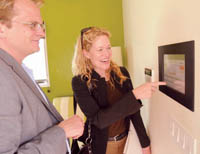Going Global
Beth Galante quit practicing law to build energy-efficient homes in the Ninth Ward
 Beth Galante grew up and went to college in Missouri, but after a senior trip to Jazz Fest she turned down a job with a senator and enrolled in Tulane University Law School. For the past 15 years, she has been an environmental lawyer in New Orleans. After Hurricane Katrina, though, she gave up practicing law to direct the new, local branch of Global Green USA, a national environmental nonprofit, which is building energy-efficient homes in the Lower Ninth Ward, improving the efficiency of local schools and teaching citizens how to make their own homes green.
Beth Galante grew up and went to college in Missouri, but after a senior trip to Jazz Fest she turned down a job with a senator and enrolled in Tulane University Law School. For the past 15 years, she has been an environmental lawyer in New Orleans. After Hurricane Katrina, though, she gave up practicing law to direct the new, local branch of Global Green USA, a national environmental nonprofit, which is building energy-efficient homes in the Lower Ninth Ward, improving the efficiency of local schools and teaching citizens how to make their own homes green.
What makes a building green?
It’s energy efficient. It has good-quality indoor air. And it uses recycled or rapidly renewable materials.
Can older buildings be made green?
Absolutely. The greenest building is the one you don’t have to build.
But isn’t green-building expensive?
People cannot afford not to build green. Our utility bills have gone up more than 30% since Hurricane Katrina. Low-income people are more impacted, because they pay a higher percentage of their income for utility bills.
Is there a tension between green rebuilding and historic preservation?
That’s a common misperception. Historic building advocates are mainly concerned with preserving the architectural heritage and the neighborhood. They never say, “You need to leave the antique plumbing or the knob-and-tube electrical system.” You can have a visually attractive, historic building that uses modern products to keep your utilities down.
What is the goal of Global Green’s Holy Cross Project in the Lower Ninth Ward?
When it’s done there will be five homes, an 18-unit apartment building and a community center. The first home, which we’re using now as a visitors center, is special. It doesn’t use any electricity. Zero. The house is 73% more efficient than a typical code house. We monitor our energy use, and you can actually see how much power is being generated by the solar panels, how much water we saved in our cistern. It’s a teaching house. I hope every single resident of the city will have a chance to visit it.
Why are green schools so important?
Green schools are one of the best investments in the future of our children. Children in green schools have been shown to do better on standardized tests. They are healthier. They have fewer respiratory problems and fewer asthma attacks, which mean fewer sick days.
Are New Orleans schools particularly inefficient?
Generally, when you build a public building, you expect it to have a useful life of about 50 years. A school built in the early 1900s, like many in New Orleans, was not expected to be used in the same form 80 years later. So Global Green is setting up a model of how to retrofit these schools.
You spent 15 years as an environmental attorney before joining Global Green. Why change careers?
You truly have the power to benefit people by practicing law. But this job at Global Green has enabled me to help so many more people. And frankly, it’s a lot more life affirming. After the hurricane, instead of fighting with people as a litigator, I personally wanted to find something that was more positive and optimistic.
How can we make New Orleans a greener city?
Look at your own homes. If you need help, come to Global Green or go to our Web site. And then act on it. Change out those lightbulbs. Get that more efficient refrigerator. We can also always use volunteers. If it’s not Global Green, there are a lot of good organizations that could use the help. If we don’t save this city, then nobody will.
For more information about Galante and Global Green USA, visit www.globalgreen.org/neworleans/ or stop by its resource center in the CBD or the visitors center at 409 Andry St., in the Lower Ninth Ward. Hours are Monday, Wednesday and Friday 11 a.m. to 4 p.m. and Saturday 10 a.m. to 1 p.m.
